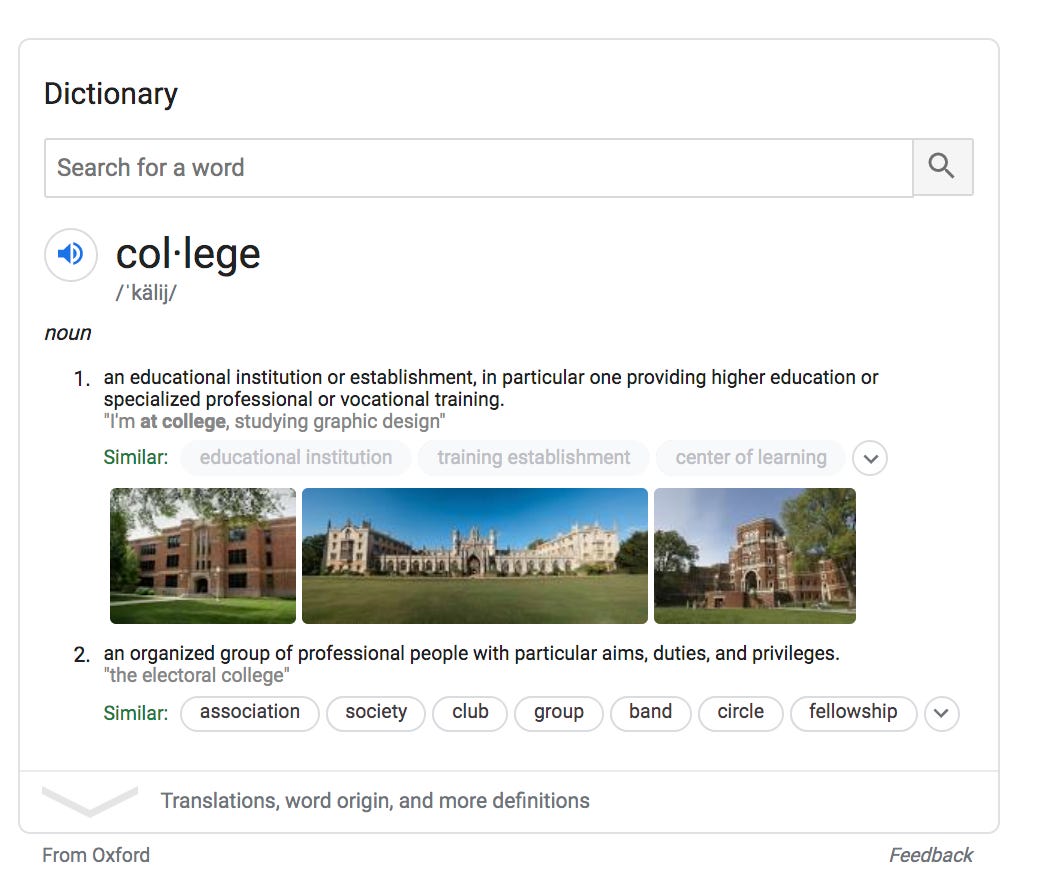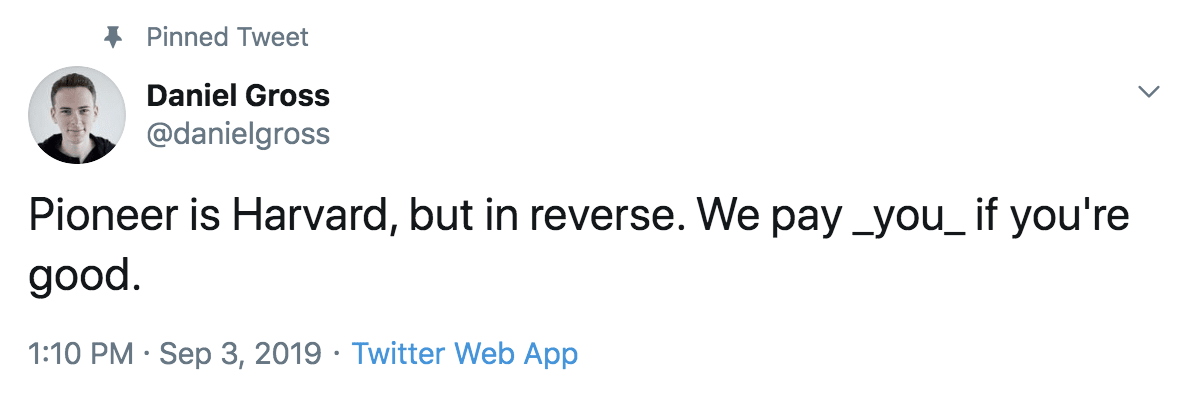
What is Y Combinator? If you ask anyone in the bay area that, they’ll likely call it an accelerator for startups who want to reach a billion-dollar valuation. Some may still call it an incubator. Others could refer to it as a VC firm. After doing some digging, there isn’t actually an agreed-upon word that describes, that YC itself aligns with. So I’m going to propose a new one; Y Combinator is a 21st-century school, just no one realizes it yet.
There are multiple forces at play here, so I’m going to break each one down to back up my argument that YC is more of a school than an accelerator. Bur first, what is a school in this context?
What is a school?
If you Google “College”, you’ll see this as one of the top definitions:

The definition focuses on the education side, but thanks to the internet, there are millions of schools now. Under this definition, Youtube is a school, as is Udemy and Teachable. I don’t think these companies are equivalent to a Stanford or Yale, so I’ll tack one more definition to the word.
A school is a place where you:
Learn skills that you can deploy in the workforce
Join a network with some degree of exclusivity
With that in place, there are three reasons I think YC is as much of a school as Stanford is.
1. YCs funding model is based on equity, Just like modern education models
When one thinks of a higher-ed school, they might think of Harvard, Yale, Arizona State University, etc. They think of the classic schools where you pay $50,000+, you get a degree, then you’re off into the workforce. Thanks to the gaping wound in our country that is student debt, there is a new slew of schools that are popping up that are accepting tuition in a different way. Through income share agreements, or ISAs
An ISA is where a student goes to school, learns a bunch of skills, finds a job, THEN they start paying back their ISA. It plays nicer than a loan as well. Some school leading the charge here are Flockjay, Lambda School, and Microverse. This funding model looks very funky because students don’t pay cash to get into the school. They pay in equity. Lambda bets on students they think are going to do well in the workforce, and they take on the risk in the hopes that that student will do big things post-education. Lambda invests in that student, and they have equity in exchange. Sound familar?
Yes, it sounds strange but dozens of schools have adopted this approach, including traditional schools like Purdue. In some ways, these schools are like investments firms, taking bets on high aptitude student, as they expect a reward one day. This looks a lot like YC.
YC Has Been Doing Doing This Since 2005
YC takes equity in its founders in hopes of a payoff one day, just like Lambda School, Flockjay, Microverse, etc.. It could be argued that YC is the original ISA agreement, leading the charge on the new model of education a decade before anyone else caught on. Daniel Gross tweeted something about his own school-esque like company, Pioneer.

Whether the pay is education, cash, or an investment, things feel like it’s the reverse of the tuition model. YC was just the first mover.
2. YC is a Masters in Job Creation
YC is a school that teaches the skill of job creation. This is crucial because as automation starts to kill out millions of jobs, the country is going to need to lean more on entrepreneurship to create new jobs in the market.
If this is true, then YC is one of the most important institutions on planet earth because they are teaching the art of creating jobs through entrepreneurship! So is YC teaching an in-demand skill that is marketable? Yes. Creating jobs and building companies is the most in-demand skill, going into the automation age.
3. Y Combinator started small, but is growing (Just like Standard and Harvard did)
Y Combinator started off with small batch sizes. 11 startups were in the first batch. 14 years later, there are hundreds of companies in each batch. The number of partners have grown, and their reach has exploded with Startup School. It’s worth mentioning that the structure of YC is very school-like as well.
Founders go to a group dinner once a week to listen to a guest speaker. (Lecture). They have office hours( teacher office hours). And then there’s Bookface, which gives you access to the network if you get stuck, need help, etc (Network). With the scale that YC has achieved, the networks effects, brand recognition, and competitive moat that YC achieved may never be matched by schools in the same domain.
No one can’t just start a Y Combinator clone and legitimately compete. It’s not about the money. It’s about the network. The alumni. The history. And it only started 15 years ago!!! Harvard was founded in 1636. If YC can create over $100B in value in 15 years, imagine what they can do in a century or two.
So, what is YC?
YC’s funding model looks a lot like the next generation of schools, they teach the most important skills there is to know for the future, and they are growing just like a university does. If YC doesn’t fit into the definition of an incubator, doesn’t operate like a VC firm, and doesn’t identify as an accelerator, then what is it?
I’m putting my money on that in 100 years, we’ll look at YC and see a school. One more esteemed than Stanford. Does it sound crazy? Maybe. Could I be wrong? Yes. But, if there’s one thing YC educated me on through their free content the last 3 years, it’s the following. Your goal is to have unpopular opinions…AND be right 😉



